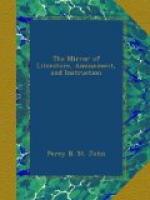MR. MOORE, THE POET.
At Mayfield, near Ashbourne, is a cottage where Moore, it is stated, composed Lalla Rookh. “For some years this distinguished poet lived at the neighbouring village of Mayfield; and there was no end to the pleasantries and anecdotes that were floating about its coteries respecting him; no limit to the recollections which existed of the peculiarities of the poet, of the wit and drollery of the man. Go where you would, his literary relics were pointed out to you. One family possessed pens; and oh! Mr. Bramah! such pens! they would have borne a comparison with Miss Mitford’s; and those who are acquainted with that lady’s literary implements and accessaries will admit this is no common-place praise—pens that wrote “Paradise and the Peri” in Lalia Rookh! Another showed you a glove torn up into thin shreds in the most even and regular manner possible; each shred being in breadth about the eighth of an inch, and the work of the teeth! Pairs were demolished in this way during the progress of the Life of Sheridan. A third called your attention to a note written in a strain of the most playful banter, and announcing the next “tragi-comedy meeting.” A fourth repeated a merry impromptu; and a fifth played a very pathetic air, composed and adapted for some beautiful lines of Mrs. Opie’s. But to return to Mayfield. Our desire to go over the cottage which he had inhabited was irresistible. It is neat, but very small, and remarkable for nothing except combining a most sheltered situation with the most extensive prospect. Still one had pleasure in going over it, and peeping into the little book-room, ycleped the “Poet’s Den,” from which so much true poetry had issued to delight and amuse mankind. But our satisfaction was not without its portion of alloy. As we approached the cottage, a figure scarcely human appeared at one of the windows. Unaware that it was again inhabited, we hesitated about entering; when a livid, half-starved visage presented itself through the lattice, and a thin, shrill voice discordantly ejaculated,—“Come in, gentlemen, come in. Don’t be afeard! I’m only a tailor at work on the premises.” This villanous salutation damped sadly the illusion of the scene; and it was some time before we rallied sufficiently from this horrible desecration to descend to the poet’s walk in the shrubbery, where, pacing up and down the live-long morning, he composed his Lalla Rookh. It is a little confined gravel-walk, in length about twenty paces; so narrow, that there is barely room on it for two persons to walk abreast: bounded on one side by a straggling row of stinted laurels, on the other by some old decayed wooden paling; at the end of it was a huge haystack. Here, without prospect, space, fields, flowers, or natural beauties of any description, was that most imaginative poem conceived, planned, and executed. It was at Mayfield, too, that those bitter stanzas




